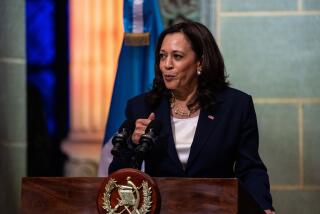Instead of Needed Changes, Administration Continues a Failed Policy
- Share via
WASHINGTON — Those who had hoped for something new in Cuba policy were deeply disappointed by the measures the Clinton administration announced last Tuesday. What had been called for was a thorough review of policy that would lead to sweeping changes. What we got instead was a series of unimportant small steps, some impractical, others a timid augmentation of what we are already doing, but none that alter policy in any significant way. Still, even timid steps forward are better than none at all, and the hard fact that the policy has failed may yet force a more substantial change of course.
Thirty-nine years after the U.S. embargo was first imposed, Fidel Castro is still in power. The embargo has accomplished nothing, but neither did it cause serious problems with the rest of the international community. No one country is obligated to trade with another. Hence, while regarding our refusal to trade with Cuba as eccentric, other countries also saw it as none of their business.
Ironically, however, it was then that Washington went beyond a simple embargo. With the Cuban Democracy Act in 1992, Washington began telling companies incorporated in other countries that they could not trade with Cuba. In the Helms-Burton Act of 1996, it threatened to haul foreign companies into U.S. federal courts if they “trafficked” in expropriated property in Cuba and warned foreign banks not to provide credit to Cuba. Helms-Burton has caused serious problems with our closest friends and trading partners and generated a strong rejection of U.S. policy toward Cuba on the part of the international community.
It was against this background of a failed policy that, last October, a distinguished group, largely made up of Republicans, called on the president to appoint a bipartisan commission to conduct a thorough policy review.
Coming as it did from Sen. John W. Warner (R-Va.) and 24 other senators, and from former Cabinet members of GOP administrations, including former Secretaries of State Henry A. Kissinger, Lawrence S. Eagleburger and George P. Shultz, the call for a bipartisan commission would have provided the president with effective political cover. He could not have been attacked by conservative Republicans for going along with an idea that essentially came from their own ranks.
At first, the administration seemed amenable, but conservative members of Congress, led by Sen. Robert G. Torricelli (D-N.J.), and the right-wing Cuban exiles in Miami and New Jersey voiced strong opposition. Reportedly, one Cuban American congressman warned Vice President Al Gore that appointing a bipartisan commission might jeopardize his chances of winning the presidential elections in 2000.
This was somewhat of an empty threat, given that it was mostly Republicans behind the commission idea. It was a matter of the exiles saying to Gore, “If you do what these Republicans are suggesting, we won’t vote for you.” But for whom would they vote? The candidate of those who had put the idea forward?
Nonetheless, the administration caved. It announced there will be no commission and no policy review. There was no need for one, the administration asserted, because there was a strong consensus in favor of the existing policy. But if that was true, why did respected people from both sides of the aisle insist a review was needed? Why did the idea have strong support from the foreign-policy establishment?
As a sop to those who had hoped for more, on Jan. 5 Clinton announced measures he said would expand contacts with the Cuban people and show support for them, but also keep the pressure on the Cuban government. The number of charter flights carrying Cuban Americans to visit family in Cuba will be increased and will be routed from other cities besides Miami and Havana. Processing of visas and licenses will be streamlined, and there will be more cultural, academic and sports exchanges, including exhibition baseball games between a Cuban team and the Baltimore Orioles. The latter is the only thing that could be termed a breakthrough: More than 20 years ago, Castro suggested a baseball game.
The other measures, however, are not likely to increase appreciably the flow of people between the two countries. Still, any increase is better than none. The same could be said of the increased remittances that will be allowed. Cuban Americans currently can send $1,200 per annum to family members; under the new rules, any U.S. citizen can send that much to private citizens or entities on the island. A church in Los Angeles, for example, that has a relationship with a church in Cuba can now send money. Presumably, Americans could also send money to Cuban friends to help start small business, say, a private restaurant. Any increase in the flow of dollars to Cuba’s hard-currency-short economy will be helpful.
The proposed sale of food to private institutions, the sale of fertilizers and farm implements to private farmers and cooperatives, and the proposal to begin direct mail service between the U.S. and Cuba will be more difficult to implement. Neither private restaurants nor farmers have any means of buying such goods. The importation of goods and the system for distributing them are in the hands of the government. So unless U.S. firms can sell to government entities, or unless Cuba modifies its means of importation, few sales are likely to be made. As for direct mail service, the Cubans have long taken the position that it will require regularly scheduled air service, not charters. That would require a civil air agreement between the two countries.
The administration’s proposal for increased funds for Radio and TV Marti is just absurd. Radio Marti was moved to Miami in violation of its mandate and has become another vitriolic exile station, paid for by U.S. taxpayers. Given its stridency, Radio Marti’s listnership in Cuba has plummeted. More money won’t help. As for TV Marti, over the years, the U.S. taxpayer has wasted some $120 million on it, even though it is never seen nor heard. Talk about throwing good money after bad.
So, an opportunity has been lost. A bipartisan commission could have recommended effective changes in policy and won public support for those changes. Short of that, Clinton could have opted for more meaningful steps. He might, for example, have indicated the administration’s support for legislation to lift the embargo on the sale of foods and medicines, might have removed all travel controls or announced the closure of TV Marti and the transfer of Radio Marti back to Washington, where it can be brought under the effective control of the Voice of America.
Most important, the Jan. 5 announcement might have been couched in different terms, terms designed to indicate our readiness to enter into a more constructive relationship with the Cuban government. People-to-people contacts are useful, to be sure, but it is an illusion to think we can deal only with private entities and citizens in Cuba. Sooner or later, if we want to encourage the government to move ahead with reforms, we must deal with that government. But that is a message that has not yet registered with the Clinton administration.
More to Read
Get the L.A. Times Politics newsletter
Deeply reported insights into legislation, politics and policy from Sacramento, Washington and beyond. In your inbox twice per week.
You may occasionally receive promotional content from the Los Angeles Times.









